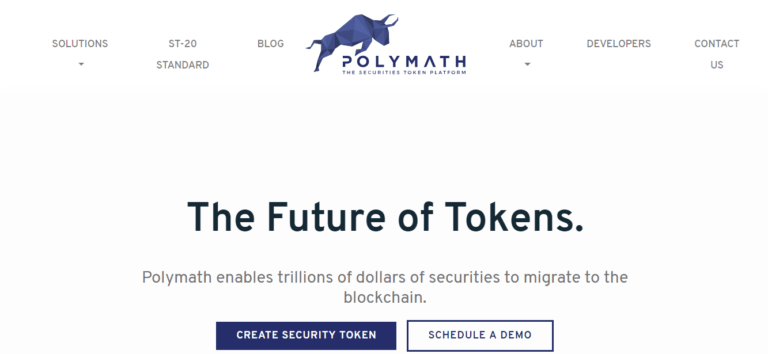Developers of Polymath, a platform designed to help securities “migrate” to the blockchain, have decided to lock up 75 million POLY tokens for the next five years.
POLY tokens are the Polymath network’s native cryptocurrency as they are used for conducting all transactions on the security token offerings (STOs) platform. At press time, each POLY token is trading at $0.118 and the market capitalization of all POLY tokens issued so far stands at nearly $45 million, according to CryptoCompare data.
75 million POLY tokens, currently worth about $9 million, represent 7.5% of the cryptocurrency’s total supply and about 25% of the current circulating supply. Chris Housser, a lawyer and the co-founder at Polymath, told CoinDesk:
A lot of projects have shut down or done major layoffs lately due to lack of funds. What we are demonstrating is that our treasury is healthy and we don’t have a need for these tokens at this time.
ST20 Token Standard Ensures Regulatory Compliance
Notably, Polymath has developed a new token standard called the ST20, which is “an extension” of Ethereum’s ERC-20 token standard. The transfer of ST20 compliant tokens can be restricted, whereas ERC-20 tokens “can be freely traded by anyone”, Polymath’s official website notes. Although utility tokens may be traded without restrictions, Polymath’s development team explains that “all securities holders must be” know-your-customer (KYC) and anti-money laundering (AML) verified.
Developers of the Polymath platform claim that their ST20 token standard provides a solution to the problem of unregulated “distribution and trading of securities.” As explained by its development team, the ST20 compliant tokens “allow security token issuers to maintain regulatory compliance through transfer restriction … [ST20] is backward compatible with ERC-20, making it interoperable with … [current] blockchain infrastructure.”
Founders & Company’s POLY Tokens Locked Until 2024
Explaining how Polymath raised $58.7 million in January of 2018 through an agreement filed with the US Securities and Exchange Commission (SEC) for future tokens, Housser added:
Thankfully we decided early to diversify a lot of ETH/BTC holdings.
Most of the 75 million locked-up POLY tokens reportedly belong to Polymath (the company) as 74% (57 million) will be held in reserve for a five-year period. Meanwhile, 26% (18 million) of the locked POLY tokens belong to the Polymath’s founders, Housser said. POLY’s smart contract requires that the tokens are released to their owners periodically until 2022, however the Polymath development team will be redirecting some of these tokens to a different smart contract that will be used to keep them locked until January 1, 2024.
As mentioned, POLY tokens are used for all transactions on the Polymath network as the platform’s native cryptocurrency allows users to launch their own security tokens (STOs).
“People Really Like The Idea Of Fractionalized Ownership”
Interestingly, Housser believes many assets will be tokenized in the foreseeable future and that the real estate business may be the first to issue security tokens. According to Housser:
People really like the idea of fractionalized ownership and the ability to own a piece of something that would be much more difficult to do in the traditional world. With more real-estate-based financial products on the blockchain, there will be greater ability to bundle these products to go long on certain areas and short on others.
On January 25, RealBlocks, a blockchain-based platform for tokenizing real estate, announced it had completed a $3.1 million seed funding round led by Morgan Creek Digital, Cross Culture Ventures, Ulu Ventures, and several other major venture capital firms. As a decentralized real estate platform, RealBlocks’ users can tokenize private equity shares and trade them in domestic or overseas markets. The platform’s users can accept digital currency and fiat money.








